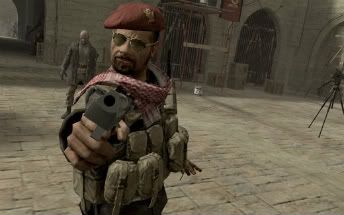Apologies to those who may have been checking this space once in a while. Mid-semester has been kicking in full gear lately, and extensive coverage of a great film festival here in Montreal has effectively ate up all of my free time. That and playing Far Cry 2 ; )
Actually, it might be another month before I write again, so I hope you indulge me as I dive into this, my most ambitious piece to date.
(*Full disclosure: this essay was written at two very distinct moments by a novice practicioner of the form, which may explain a certain disparity in tone and subject.)
Actually, it might be another month before I write again, so I hope you indulge me as I dive into this, my most ambitious piece to date.
(*Full disclosure: this essay was written at two very distinct moments by a novice practicioner of the form, which may explain a certain disparity in tone and subject.)
One of the greatest films of 2008 (and indeed of this closing decade) is Laurent Cantet's Entre les murs, better known as The Class to English audiences. Mostly taking place "between the walls" of a multiracial French classroom, it lacks in common elements of spectacle but more than makes up for this by presenting a forthright, passionately observant portrayal of its chosen subject. Carefully planned with the cast of ordinary students, long scenes play out in improvisational manner, and provide a fascinating snapshot of life as it plays out for a definite group of people over a given period of time. With boundless patience and absolute modesty, The Class simulates an inside view of a world which remains out of bounds for most of this planet's dwellers.
Conversely, few would argue that one of the greatest video games of the last couple of years is Call of Duty 4: Modern Warfare. With it, developer Infinity Ward has pretty much pushed every technical asset of the first-person shooter arsenal to its limits. Explosive sound effects, aggressive AI, weapon physics ; whatever, it's all there. But moreover, they also managed to imbue their product with a genuine sense of place and tension, crafting scenes of seldom-equaled intensity ; depictions of pain, confusion and terror, all absolutely relevant to the subject. While still taking place in a fantasy version of history and politics, as well as including narrative turns that revert to the most elementary conventions of action storytelling, it's an impressive achievement for this particular form and genre, and representation of war in a video game has probably never been so close to that of authentic documentary footage... or actual human perception, for that matter.
You may be starting to grasp where I am heading with this, but let's not get ahead of ourselves and carefully define our question. Yes, both creative efforts I just described share an apparent willingness to depict a given phenomenon with certain verisimilitude. They also share the aspect of not being assembled from actual documents of the events on which they are based, but fully constructed from the bottom up. However, the crucial point on which they differ (apart from their obvious disparity in scale and intensity) is that of their respective materials, and namely of the essential divide between photographic and digital media. But does that prevent one or the other to strive for a plausible image of the world?
While this alterity may appear self-evident, it seems appropriate to point out specific distinctions between the mediums. Whereas a movie essentially consists of a series of camera movements and angles deliberately sequenced and paced by a film editor, a game played in first-person perspective such as Modern Warfare allows the user to be in command of the viewpoint at all times. The actors of a live-action film are gifted with free will and spontaneity, and thus never fully manageable by the director, while the procedural behaviours of a video game cast are hand-crafted by a team of specialists capable of anticipating their every move (at least in theory). Where does that leave us with regards to both instruments' capacity of evoking life as we know it? Perhaps, despite these major discrepancies, in a common abstraction that precedes any artform: the concept of scenes unfolding, beheld by a gaze.
Mankind's ability to see, hear and otherwise feel is without a doubt one of its greatest blessings. While some details will always escape our awareness, it is by "sensing" things that we receive the world and give it meaning, order, purpose. At the same time, the history of the arts has seen our techniques of representation drawing ever closer to actual perception, with film as a crowning pinnacle of sorts (Janet Murray and Marie-Laure Ryan, among others, have greatly elaborated on this topic). It is a fallacy, however, to believe that photographic film stops at providing impressions of the world as is, without mediation ; with ever more sophisticated means of manipulating and associating images, filmmakers have found ways to orient "reality" as they see fit, even when the acts on screen are basically out of their control. Some even craft entirely fictional spaces that can still be enjoyed by the common mortal soul, due to recognizable traits beneath the artifice.
In short, to watch a film essentially amounts to a contract of sorts: that of submitting to an artist's vision as something that can be trusted, and expecting it to surprise, to provide insights, to reflect our world in a different light. Which doesn't deny the fundamental "reality" of the objects filmed, at the most basic level of existence. The introduction of the video game, on the other hand, completely alters the manner in which we relate to moving images and sound.
What do I see when I gaze off the top of a hill in Shadow of the Colossus? I contemplate a deserted landscape which, in my mind at this precise moment, possesses an undeniable reality, and which has been designed to make me feel deeply, deeply alone. When I attend a conversation between two non-player characters in Half-Life 2 (a game which may have nailed the "scene" template better than any other), I am witnessing careful choreography that stirs up dramatic tension, or is at least intended this way. But if I prefer to hug the walls and look for power-ups while the action is taking place, or to rush to my next target without pausing to take the world in, I am basically free to do so. Unless particular measures have been hardwired in the program, none of this behaviour prevents the rest of the game world from existing, nor its particular events from unfolding with me completely missing out. It might be my loss, but it might on the other hand cast the piece in a different light. One that develops from my own input.
More so than a film, a work of interactive media is the result of intensive construction. The fact that an object is even admitted in the isolated reality of a video game presupposes a deliberate creative effort, rather than a simple selection of pre-existing materials (see Bordwell and Thompson's take on the "profilmic" layer). But does the very presence of an item or system in a gameworld entitle the player to consume it at all costs? A common criticism of the Grand Theft Auto games is precisely that they are filled with so much content that they end up having no meaning at all, apart from their embrace of total anarchy ; one needs only to compare with the lack of distractions in a game such as Ico to emphasize Rockstar's "maximalist" approach. But even the most focused of games will require the player to make choices ; in other words, to act as co-director and -editor of his or her performance.
Despite some meandering (see the title of this blog...), we are getting closer to my initial thought, which is that video games, to a further extent than film, demand some measure of pacing and prioritizing, if only on a psychic level. And I am not speaking of "moral choices" and other "big" game moments, but of the actual manner in which the content is experienced. I personally happened to spend upwards of an hour with each girl of The Path, and to plod through Assassin's Creed (twice!) mainly by leisurely walking from station to station. Did this significantly alter the basic narratives the designers were trying to communicate? No, not exactly. But it absolutely did change my perception of what could be deemed "important" within these particular game environments and systems. It compelled me, sometimes bored me, made me pay attention to the small details and the larger tone ; but most of all, it never failed to absorb me in the self-contained reality of these virtual universes, despite the failings of their fictional components.
With all this in mind, I ask frankly: why don't video game developers at least try to approach the kind of "trivial" topics depicted in The Class, or countless works of cinema over its century of existence (to stay within the French output of recent years, Abdellatif Kechiche's The Secret of the Grain is another great example)? It appears to be accepted that by its very nature as an "artificial" medium, the video game is much better suited to expressions of the abstract and fantastical, and I have no problem with this admission. But when I see the magnificent efforts deployed by the studios in creating believable textures and lighting, animation, physics, procedural behaviours, I can't help but feel that all this energy could be dedicated to subjects of such greater human interest. We already had the brilliant Façade, but no one would argue that this was a flawed and over-ambitious exercise in dynamic, first-person communicative gameplay. Meanwhile, several independent developers exhibit their interest for the seemingly-mundane through projects of great quality, but with lacking resources and obsolete design tropes (see Back Door Man, one of my personal favorites this year, about a night in a male prostitute's life).
Through some cosmic alignment of conscience and technology, I want to be absorbed in a space my body will never occupy ; to experience a down-to-earth story from the inside ; to choose what and how I want to perceive and, through this freedom, to look closer, and deeper ; and, hopefully, to fill some role in the scene...
I realize that with all this talk of feeling and immersion, I may have underplayed the importance of engaging mechanics in video games. Cinema will never have this problem (it has enough of its own...), but there is no doubt that smartly-implemented gameplay can go a long way in actually making the user care about what is happening on and off the screen, and possibly alter its meaning and weight. However, I believe this piece has drawn long enough for now, and that this crucial aspect of the "communication problem" deserves a dedicated post. In preparation of this topic though, let me ask this question: what will you do when personally confronted with the leaked scene of Modern Warfare 2?




It is interesting that you bring up the Modern Warfare 2 example. I had just witnessed it the other night, and I was surprised at my own reaction. I wasn't surprised at the content itself; many action films and the like have depicted much worse scenarios in the past. What really got to me was the actions of the player himself. During the scene, he participated in a manner that almost seemed crueler than that of his cohorts, almost as if he were relishing in the acts.
ReplyDeleteI tend to naturally be the good guy when I play games. As such, I know for an almost certainty that I would not be gunning down (virtual) innocents beside my cohorts. In fact, I would probably even try to save them somehow by turning on my team-mates, although I doubt that game would allow me to progress with that choice.
Don't get me wrong, I applaud the people behind Modern Warfare 2 for not pulling any punches and for defending their position when questioned about it. It just goes to show the power of the medium; in a film, you can be a disembodied witness to a massacre. In a game, though, you are forced to make some sort of choice regarding your actions. You are no longer on the sidelines: you are a participant, regardless of which actual outcomes the developer allows you.
Thanks for answering the call (so fast!).
ReplyDeleteIndeed, I think we can easily agree that this sequence does push some sort of envelope. It is not about fun. It is barely about interesting game mechanics (although that remains to be seen). Mainly, it appears to be about setting a scene, creating a feeling of undeniable, self-contained reality, and then asking the player to engage with it, on a truly psychological, and thus not only systemic level. The reaction you describe and that many gamers have shared over the last days is a sign of our collective growth, of our realization that, while this is not the only thing that video games must do, it is one of the things that they can do, and very effectively at that.
It's not even a question of graphics or technology ; dots and bars can instill feelings of urgency and horror, as long as the intent is there and the programming is appropriate. If the 3-D tools are available, well, all the better... But developers must understand that there is another layer of "reality" beyond the mere exterior of things, and then look for ways to translate those hidden connections in situations and sets of interactions with actual weight, even if that means keeping some elements out of the control of the player in order to orient the meaning properly. Interactive narrative should be creative collaboration, not domination from one of the parties involved.
And here I am starting another rant... I sure hope that the rest of Modern Warfare 2 holds up to what we have seen. Thanks again for reading :)